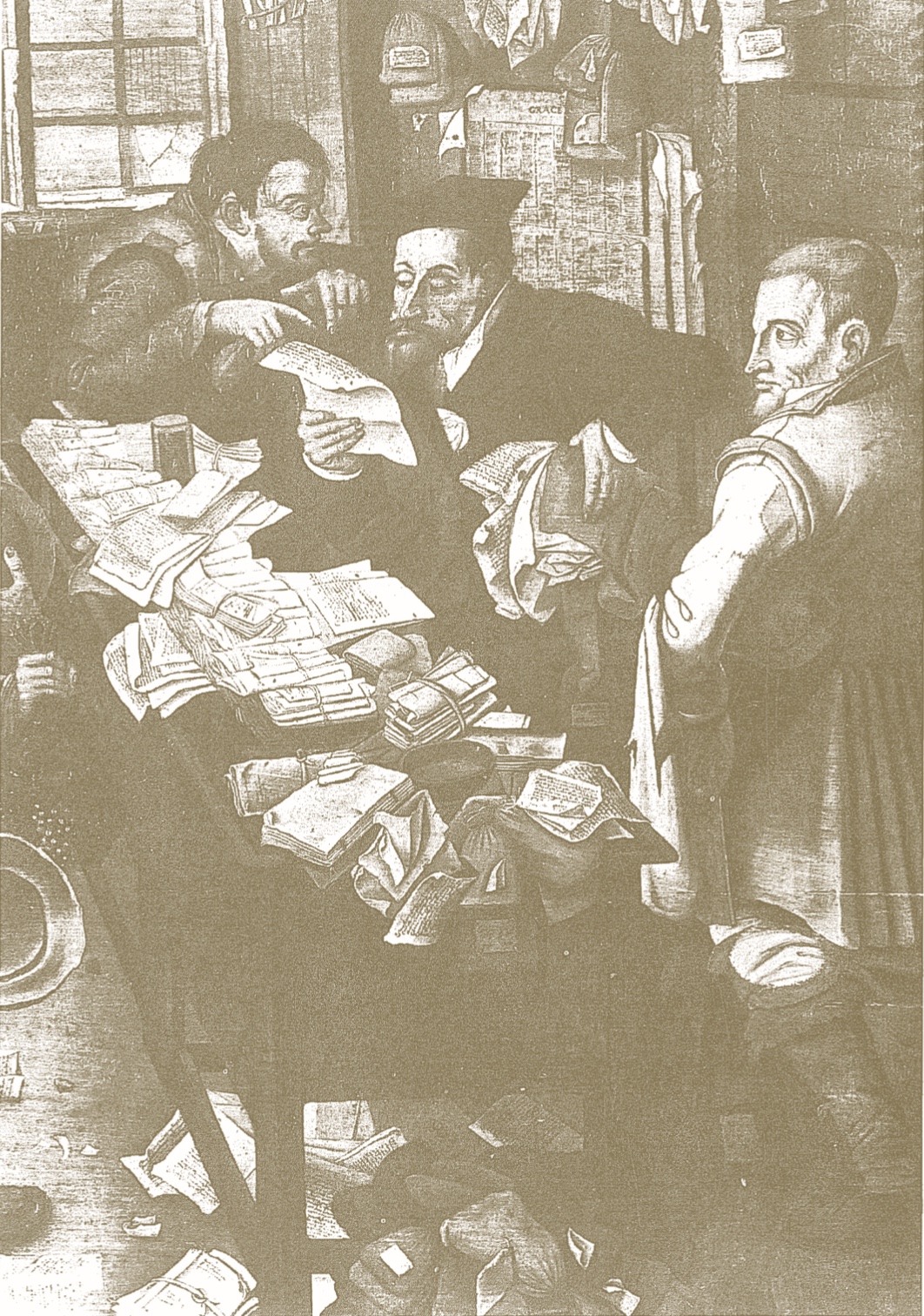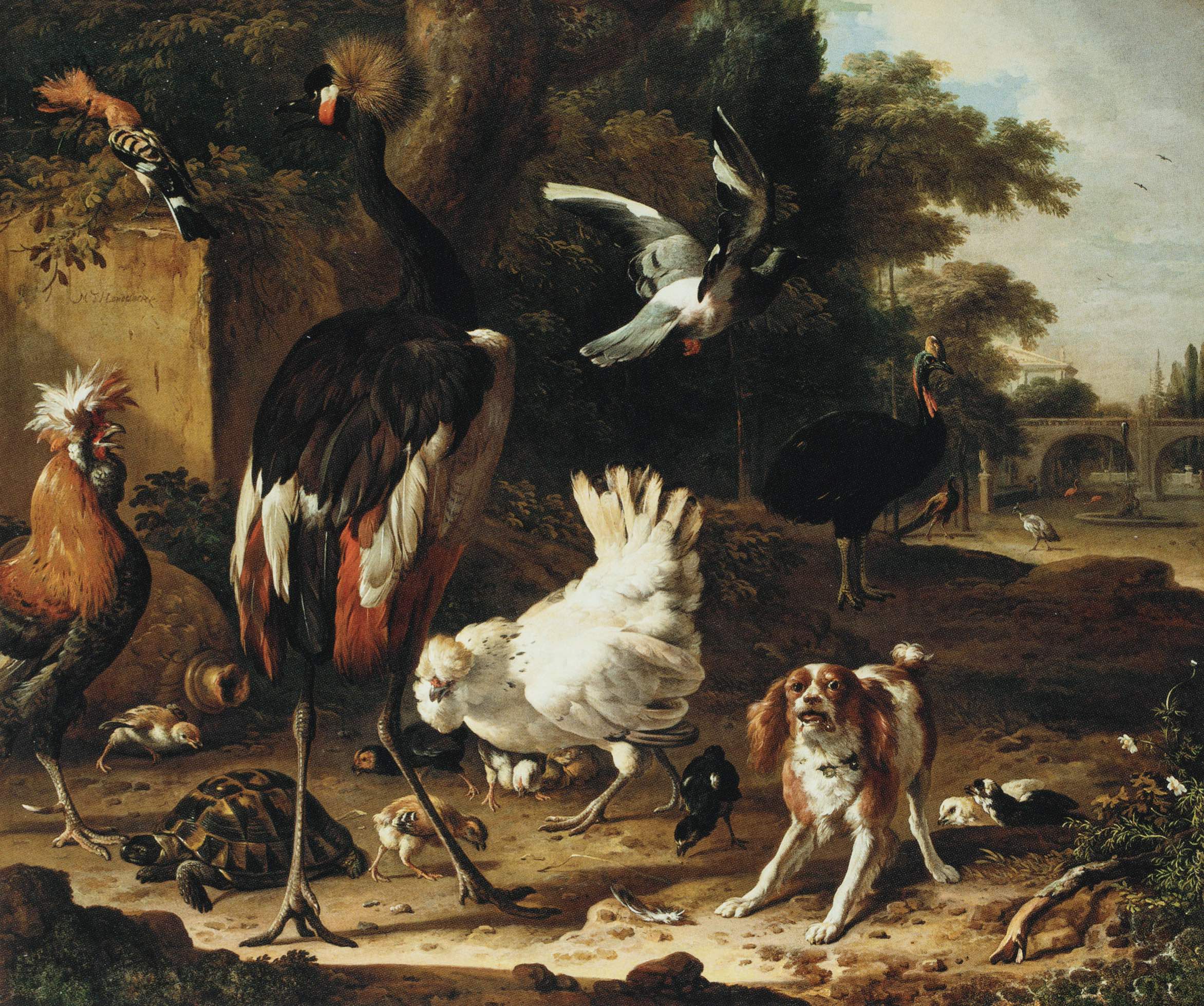‘What we need these days isn’t a critique of Marxism, but a modern theory of money as good as Marx’s that goes on from where he left off.’
Gilles Deleuze
The Italian sociologist and philosopher Maurizio Lazzarato has written a lot about the way in which capitalism in our time consists of producing ‘the indebted man’. Here he elaborates on the theory that the economy became entirely political for the first time after debt-currency appeared. It was created by the banks out of nothing, after Richard Nixon announced in 1971 that the US dollar would be leaving the gold standard.
‘What we need these days isn’t a critique of Marxism, but a modern theory of money as good as Marx’s that goes on from where he left off.’
Gilles Deleuze

Pieter Bruegel, The Payment of the Tithes (The Country Lawyer), 1626 (detail)
In Capital, Volume 1, Marx traces the development of barter and exchange. The process of exchanging commodities leads to one particular commodity playing the role of currency. The origin of money is therefore commercial or mercantile in nature; it serves to facilitate trade, measure and accumulation. The Grundrisse operates differently, viewing money directly as capital with mercantile functions subject to capitalist functions. The commercial origin of the concept is no longer central to the argument: money is used instead to command and exploit the labour force directly. It represents investment and the ability to claim ownership of labour, and it therefore performs a directly capitalistic and political function.
Neoliberalism emerged following a decision related to money, raising a series of issues which cannot be addressed solely in terms of Marxian categories. In 1971, the Americans severed the link between the dollar and gold. Money was disconnected from its ‘economic’ base and ‘mercantile’ foundations, as well as from its grounding in ‘labour’, and took on a directly political function.
Two French philosophers, Michel Foucault and Gilles Deleuze (along with Guattari) performed an analysis of this new money, which can help us to understand its nature and functioning. Foucault presented an interpretation of money which shifted the terms of the Marxian debate several months prior to Nixon’s decision, while Deleuze and Guattari followed suit a year later. According to the former, who analysed the emergence of the first monetary economy in Ancient Greece, money originated in debt, war and the State. The latter thinkers, however, revisited the Marxian theory of money, declaring that money is ‘debt’, that is, it does not derive from ‘labour’ but from a new political relationship between debtor and creditor. Banks and the circulation of money are at the heart of the economy. Debt-money, unlike Marxian money, is an ex nihilo political creation operated by banks, though it also entails a flow of power, a flow of war, in order to function, as in Foucault’s model.
Even today, production is always preceded by ‘primitive accumulation’ – a violent ‘appropriation’ or extra-economic expropriation – which serves as a basis for a new ‘mode of production’ by establishing a new distribution of power. Foucault neatly describes this sequence of political and military victory, distribution of the resulting powers, and operation of a new mode of production and a new currency in his work on Ancient Greece.
As Foucault tends to adopt a genealogical approach to his ‘historical’ work, he delves into the past in search of a better understanding of the present. His first lecture to the Collège de France presents an initial introduction to the nature of the money that emerged once the link between the dollar and gold had been severed.
Foucault began by studying the initial monetarisation of the economy as a result of the relationship between war, debt and monetary creation in Corinth, where the polemarch Cypselus was brought to power by a hoplite army (a new strategy for waging war and organising soldiers) largely composed of poor, heavily indebted peasants. The war enabled them to build a political force which Cypselus was later forced to confront. This force threatened to lead to civil war, as the ‘indebted’ peasant soldiers organised collectively and put forward certain economic and political demands.
What interested Foucault was the way in which Cypselus intended to maintain power once he had achieved victory by controlling and subjecting the indebted peasant soldiers to his economic policy. In order to do so, he introduced the use of money as part of a (political) device for the (economic) integration of military power, the key to which was to ‘limit social demands [...] which the formation of the hoplite armies rendered more dangerous’, as agrarian crises exacerbated the peasants’ debt. What did the tyrant do to maintain the property regime and keep power in the hands of the property-owning class? He oversaw a partial redistribution of land to the peasant soldiers (without cancelling their debts), while also imposing a tax of one-tenth of total income on the ‘rich’. Part of the money was directly redistributed to heavily indebted ‘poor people’, while another part funded major public works and advance payments to artisans. This complex system could not be constituted ‘in kind’. The economic cycle caused the money distributed to the ‘poor’ to flow back into the coffers of the ‘rich’ (by putting the indebted peasant soldiers to ‘paid’ work), allowing them to pay their taxes (in silver), and, according to the statements made by Édouard Will on which Foucault bases his work, ensured ‘the circulation or rotation of money, and equivalence with goods and services’. Money became established as a measure and standard for ‘exchanges’ and ‘equivalences’ that led to the expansion and intensification of the debt regime and the subsequent political involvement of the State in the order of the city for the first time: taxation, levying, accumulation, price fixing, a shift from agriculture to trade and an expansion of colonisation provided the basic conditions for a market and produced a market space that was promptly controlled by the state apparatus.
Created almost ex nihilo, money emerged as a dependent of a new, ‘extraordinary’ form of tyrannical or legislative political power, which played a role ‘in the property regime, in the game of debts and repayments’ and ensured the territorial institutionalisation (reterritorialisation) of the hoplite war machine that had brought Cypselus to power. Money became linked to the exercise of power in the sense that ‘one does not acquire and exercise power because one possesses money. Rather, it is because some people took power that money was institutionalised’.
"In 1971, the Americans severed the link between the dollar and gold. Money was disconnected from its ‘economic’ base and ‘mercantile’ foundations, as well as from its grounding in ‘labour’, and took on a directly political function."
Therefore, money was not mere economic ‘capital’, as its mercantile origin would suggest. In the hands of the ‘State’, which established its use and which, through that use, was in turn more firmly established, money functioned less as a tool for redistribution than for extended reproduction of the positions of power in society. Money thus represented a continuation of civil war by other, more political means, all of which brought ‘truth’ to the game of power. On the one hand, it produced and reproduced by shifting the divisions (aristocrats, warriors, artisans, ‘employees’) fuelling the ever-present possibility of civil war as a social context that politics had to learn to address. On the other, the institution of money involved a ‘series of new regulations’ aimed at bringing the uncontrolled fight between rich and poor to an end, ensuring ‘the maintenance of class domination’ by shifting ‘social separation’ and civil war into another terrain.
For the first time, the economy became political as a result of power bringing war to money: a seizing of power and a seizing of war, whose fundamental purpose in Foucault’s work is immediately measured with regard to the Marxist economism which reduced the functions of the State, power and war to the ultimate determination of ‘economic infrastructure’. But, above all, with regard to the declaration making the dollar inconvertible to gold, the very cornerstone of all neoliberal policies.
[...]
*Translated by Eleanor Staniforth / KennisTranslations

Melchior d'Hondecoeter, The crow exposed, c. 1690
Share article